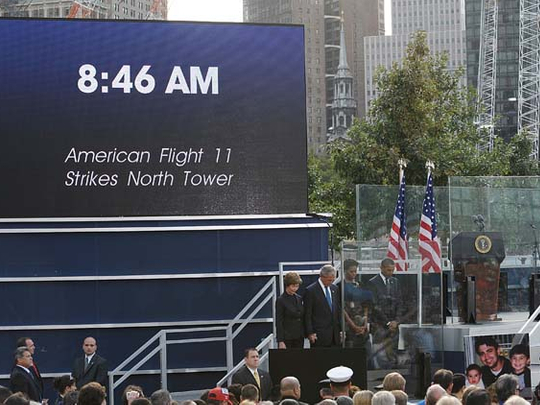
We have seen 10 years of going nowhere on one side of the border and 10 of going backwards on the other: back to bloodshed, back to civil chaos. It's simplistic to say that Afghanistan doesn't matter.
You might as well say that the 100 years of war that scarred medieval Europe didn't matter. But Afghanistan still belongs to an inchoate, old world of milling conflict. Seize power there and turmoil will soon take it away. Leave enemies to stew. The real victim of Bush's great September 11 folly is Pakistan. It might have been a buoyant nation today, joining India and China at world economic forums. Instead it is a failing state.
A decade ago General Pervez Musharraf was Pakistan's new man on top of the heap. He'd locked former prime minister Nawaz Sharif away for life. As the army habitually seized Islamabad power, there was nothing too surprising here. Musharraf's battalions depended on US weapons and cash.
Sharif's Muslim League, seeking friends elsewhere, had endangered all that. What would America do once the dust from the twin towers had cleared? Invade Afghanistan; throw out the Taliban. What could Musharraf do? Only swear to support them.
But it was never that easy, of course. The fatal border, the Durand Line, barely exists in any physical sense. Tribal areas straddle it. Rule of law barely exists, then as now. Two million or more Afghan refugees huddled in ramshackle camps on the road from the Khyber Pass to Peshawar. Pakistan (recruited by Washington as an ally against Soviet occupation in Kabul) couldn't stand idly by. It was involved in every way just as India, across its other border, was involved in keeping Musharraf off balance. A political quagmire in the making.
So today, those 10 dreadful years on? Musharraf is in London exile. Benazir Bhutto, the supposed hope of democracy, is dead, murdered by zealots. Her husband, Asif Ali Zardari, is president. And just look at the public opinion polls.
A couple of years ago Gallup Pakistan asked people in the country what the most serious threat to Jinnah's pure state was. Some 11 per cent said the Taliban, 18 per cent India but 59 per cent picked the US.
Asked the same sort of question (via the Pew Research Centre) this summer, after Bin Laden was killed, and about 70 per cent saw America as more enemy than saviour. Every drone attack runs the risk of making that opposition deeper.
Who approves of Zardari's leadership? It lurches along in the 10 per cent range, come rain or more rain. Who wants the army back? Only 8 per cent in 2009, and its commander-in-chief's ratings are slipping. The leader-in-waiting is Sharif, probably in political business again, but this is back to the future with a vengeance.
There is, in short, no consensus of any meaningful kind except, perhaps, blind antipathy towards Washington. There are no trusted institutions, no leaders who command respect, no prospect beyond the irredeemably bleak. And it is against this background that America blames Pakistan for its frailty in the fight against terrorism and cuts back on military aid. Pakistan in US eyes is an enemy, not an ally. Pakistan must be lectured and punished. But Pakistan is also a victim of western policy. So many stumbles, so many wrong turnings: but a victim nonetheless.
Its sense of grievance may be unappealing. The preoccupation with India, the futile attachment to Kashmir, the hapless swings between corrupt democracy and army autocracy are all heavy burdens. Yet the message of public opinion, in its bewilderment, cannot be ignored. For three decades of Afghan tumult, Pakistan has been blown hither and yon by outside imbecilities. And 10 full years after September 11, it is the heaviest casualty of them all.
— Guardian News & Media Ltd








